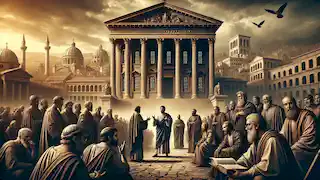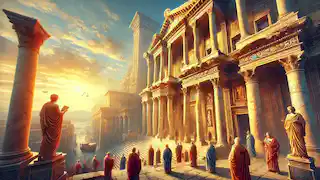Introduction
The ancient city of Alexandria was not only a beacon of learning but also a cultural crossroads where scholars, philosophers, and historians gathered to share knowledge and wisdom. At the heart of this thriving intellectual hub was the famed Library of Alexandria, an institution that housed one of the most comprehensive collections of texts from across the ancient world. The Library, once the most prestigious center of learning, was tragically lost to history. Its destruction remains a mystery, sparking the imagination of historians and scholars alike. This is the story of the rise and fall of the Lost Library of Alexandria.
Foundation of Alexandria
The story of the Lost Library begins with the founding of the city of Alexandria itself. Established in 331 BCE by Alexander the Great, Alexandria was envisioned as a city that would serve as a cultural and trade bridge between the East and West. Upon Alexander’s death, his empire was divided among his generals, and Egypt came under the rule of Ptolemy I Soter, one of Alexander’s most trusted companions. Ptolemy sought to create a legacy of knowledge in Alexandria, making it a center for scholars, writers, and thinkers.
The seeds for the Library were planted with the construction of the Mouseion, a temple dedicated to the Muses, the goddesses of the arts and sciences. The Mouseion became a center for research and teaching, and it was here that the Library of Alexandria would take root. Over the centuries, the Library became an unrivaled repository of knowledge, containing texts from Greece, Egypt, Persia, India, and even distant China. It was said to house hundreds of thousands of scrolls, many of them originals or rare copies.
A Treasure of Knowledge
The Library itself was more than just a collection of texts; it was a center for innovation and intellectual exchange. Scholars who worked there studied everything from mathematics and astronomy to philosophy, medicine, and poetry. The Library became a magnet for some of the greatest minds of the ancient world, such as Euclid, Archimedes, and Eratosthenes, all of whom contributed to Alexandria’s reputation as a city of learning.
One of the Library's most famous achievements was its role in the translation of texts. Under Ptolemy II Philadelphus, a systematic effort was made to translate texts from other languages into Greek. This project not only enriched the Library’s collections but also helped preserve knowledge that would otherwise have been lost. The translations of Egyptian hieroglyphic texts, Persian religious scriptures, and the Hebrew Bible (the Septuagint) were among the monumental works produced during this time.
But the scope of the Library’s ambitions went beyond simply preserving texts. It was designed to be a place where scholars could collaborate and produce new ideas. Eratosthenes, for example, used the resources of the Library to calculate the circumference of the Earth with remarkable accuracy, a feat that stunned the ancient world.
The Library’s Collection and Administration
Ptolemy I and his successors were devoted to the enrichment of the Library’s collection. One legend tells of how ships entering the harbor of Alexandria were required to surrender any books or scrolls on board. These would be copied by the scribes of the Library, and the original returned to the owner. Over time, this process allowed the Library to accumulate an unparalleled collection.
The Library’s holdings were so vast that it was divided into several sections, including scientific works, literary texts, and historical records. Alongside these, there was a separate archive for government records, establishing Alexandria as both a cultural and administrative hub. Scholars who worked at the Library were provided with housing, a salary, and the time to pursue their research. The structure of the Library was closely integrated with the nearby Mouseion, where scholars taught and engaged in discussions.
Ptolemy III Euergetes continued to expand the Library’s collections, acquiring rare texts from distant lands. His determination to obtain knowledge at all costs is exemplified by his decision to borrow original manuscripts of Aeschylus, Sophocles, and Euripides from Athens—works he never returned, instead sending beautifully crafted copies.
The Decline Begins
Despite its glory, the fate of the Library was intimately tied to the political and military fortunes of Alexandria itself. By the time of Cleopatra VII, the last of the Ptolemaic rulers, Egypt had become a battleground between Rome and its rivals. Alexandria's importance as a center of learning began to diminish as the city was drawn into these larger political struggles.
In 48 BCE, during Julius Caesar’s siege of Alexandria in the civil war between Caesar and Pompey, the first blow to the Library was struck. Caesar ordered the burning of the Egyptian fleet in the harbor, and the fire is believed to have spread to parts of the city, including the Library. It is uncertain how much of the collection was lost during this conflagration, but historians believe that the damage was considerable.
This event marked the beginning of the Library’s decline. Though efforts were made to restore the Library in the following years, the institution never regained its former stature. Alexandria itself remained an important city, but its reputation as a center of learning gradually faded as power shifted to Rome and later to Constantinople.
Final Destruction
The question of when the Library was finally destroyed has perplexed historians for centuries. Some argue that it continued to exist in some form for several hundred years after the Roman conquest. Others suggest that it was gradually dismantled over time as Alexandria’s political and cultural significance waned.
One theory suggests that the Library may have been severely affected during the rise of Christianity in the Roman Empire. Theodosius I, who ruled the empire from 379 to 395 CE, issued a series of edicts outlawing pagan practices and temples. Alexandria, which had become a major center of Christian thought, experienced significant upheaval during this period. Temples were destroyed, and it is possible that the remnants of the Library were also targeted during these conflicts.
Another possibility is that the Library was destroyed during the Muslim conquest of Alexandria in 642 CE. Although early Islamic rulers were often supportive of learning and knowledge, the city suffered during the conquests. Some historians have speculated that the final destruction of what remained of the Library may have occurred at this time, but this remains a topic of debate.
Legacy and Myths
The loss of the Library of Alexandria has captured the imagination of generations of historians, scholars, and writers. The story of its destruction has been told and retold, often taking on a mythical quality. The idea of a single catastrophic event, such as Caesar’s fire or the rise of Christianity, destroying the entire collection is now seen as overly simplistic. It is more likely that the Library was lost gradually, as a result of political instability, religious upheavals, and a decline in funding and patronage.
Nonetheless, the legacy of the Library endures. Many of the works housed in Alexandria have been preserved in other collections, such as those in Rome or Constantinople. Furthermore, the intellectual spirit of the Library lived on in the scholars who trained there, and their work continued to influence generations of thinkers long after the Library’s decline.
Rebirth of a Dream
In 2002, a new Library of Alexandria, the Bibliotheca Alexandrina, was inaugurated on the shores of the Mediterranean, near the site of the original Library. The new institution serves as a testament to the enduring legacy of the ancient Library and its role as a symbol of humanity’s quest for knowledge. The Bibliotheca Alexandrina houses millions of books and serves as a cultural and educational center, promoting research and learning in the same spirit that inspired the original Library.
While the original Library of Alexandria may be lost to history, its story continues to inspire people around the world. The dream of a place where knowledge can be gathered, shared, and preserved for future generations remains as powerful today as it was in the ancient world.

The Alexandria Scholars
The Library was more than just a building; it was the people who filled its halls and the minds that labored within its walls. Among the most famous of these was Euclid, whose work on geometry laid the foundations for centuries of mathematical thought. Archimedes, too, spent time in Alexandria, where he developed principles of physics that are still in use today.
One of the most intriguing figures associated with the Library was Hypatia, a female philosopher, astronomer, and mathematician who lived in the late 4th century CE. Hypatia became a symbol of intellectual freedom and the pursuit of knowledge, but her life was tragically cut short during the religious and political strife that consumed Alexandria in her time.
Knowledge Preserved and Lost
While the fate of the Library of Alexandria itself is tragic, it is important to remember that not all of its contents were lost. Many texts, especially Greek and Roman works, were copied and distributed to other parts of the Mediterranean world. Centers of learning in places like Rome, Athens, and later Baghdad ensured that much of the knowledge preserved in Alexandria lived on.

The translation movements that emerged during the Islamic Golden Age were partly inspired by the work done in Alexandria. Scholars in Baghdad, Cordoba, and Damascus translated Greek, Persian, and Indian texts into Arabic, ensuring the survival of many ancient works. In this way, the spirit of the Library continued to influence the world long after its doors had closed.
The Legend Lives On
Today, the legend of the Lost Library of Alexandria serves as both a cautionary tale and a symbol of hope. It reminds us of the fragility of knowledge and the importance of preserving our intellectual heritage. But it also stands as a beacon of what humanity can
achieve when we come together in the pursuit of wisdom.

The mystery of the Library’s final days may never be fully solved, but its influence can still be felt in libraries and research centers around the world. The legacy of the scholars who worked there, and the knowledge they preserved, lives on in every book, every discovery, and every new idea.
As we continue to uncover more about our past, the story of the Lost Library of Alexandria will remain an enduring testament to the power of human curiosity and the endless pursuit of knowledge.
The Modern Quest for Knowledge
In the 21st century, the revival of Alexandria’s cultural heritage through the new Bibliotheca Alexandrina demonstrates the importance of learning in our modern world. This grand structure, with its sweeping architecture and vast collections, serves as a reminder of the ancient Library’s ambition: to gather knowledge from all corners of the world and make it accessible to future generations.

While the new Library of Alexandria is a modern marvel, it is also a symbol of humanity’s unbroken chain of learning. Though the ancient Library was lost, its spirit lives on in every effort we make to preserve and share knowledge today.


















